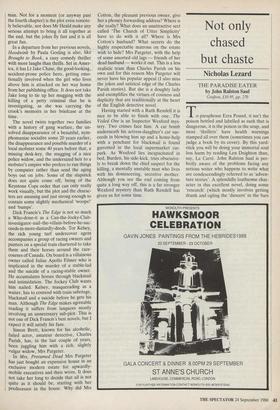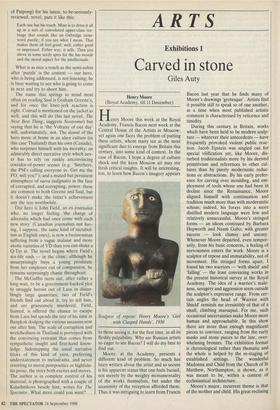Not only chased but chaste
Nicholas Lezard
THE PARADISE EATER by John Ralston Saul
Grafton, f10.95, pp. 270
To paraphrase Ezra Pound, it isn't the poison bottled and labelled as such that is dangerous, it is the poison in the soup, and most 'thrillers' have health warnings stamped all over them (sometimes you can judge a book by its cover). By this yard- stick you will be doing your immortal soul less harm by reading Len Deighton than, say, Le Cane. John Ralston Saul is per- fectly aware of the problems facing any serious writer who happens to write what are condescendingly referred to as 'adven- ture stories'. A splendidly loathsome char- acter in this excellent novel, doing some `research' (which mostly involves getting drunk and ogling the 'dancers' in the bars
of Patpong) for his latest, to-be-seriously- reviewed, novel, puts it like this:
Each one has his touch. Mine is to dress it all up in a sort of convoluted upper-class ver- biage that sounds like an Oxbridge cross- word puzzle; if you see what I mean. That makes them all feel good; well, either good or impressed. Either way, it sells. Then you shove in some seedy spies for the bas monde and the moral aspect for the intellectuals.
What is as nice a touch as the semi-colon after 'puzzle' is the context — our hero, who is being addressed, is not listening; he is busy waiting to see who is going to come in next and try to shoot him.
The name that springs to mind most often on reading Saul is Graham Greene's, and for once the knee-jerk reaction is right. Conrad is mentioned on the jacket as well, and this will do (his last novel, The Next Best Thing, suggests Nostromo) but saying that he is 'the Voltaire of our day' will, unfortunately, not. The donne of the hero more at home in an alien culture (in this case Thailand) than his own (Canada), who surprises himself with his morality; an admirably direct narrative style which nev- er has to rely on rankly unconvincing corridor-of-power scenes (e.g. 'Smithers, the PM's calling everyone in. Get me the FO, will you?'); and a muted but persistent atmosphere of saeva indignatio in the face of corrupted, and corrupting, power: these are common to both Greene and Saul, but it doesn't make the latter's achievement any the less worthwhile.
Our hero is John Field, an ex-journalist who, no longer feeling 'the charge of adrenalin which had once come with each new story' (Canadian journalists not hav- ing, I suppose, the same kind of metabol- ism as English ones), is now a businessman suffering from a vague malaise and more exotic varieties of VD than you can shake a Q-Tip at. The novel begins where Field's sex-life ends — in the clinic; although he unsurprisingly buys a young prostitute from her employer out of compassion, he remains surprisingly chaste throughout.
The McGuffin turns out, after rather a long wait, to be a government-backed plot to smuggle heroin out of Laos in distur- bingly large quantities; two of Field's friends find out about it, try to tell him, and are gruesomely murdered. Field, framed, is offered the chance to escape from Laos but spends the rest of his time in Bangkok dodging the various assassins sent out after him. The scale of corruption and wretchedness in Thailand is portrayed with the convincing restraint that comes from sympathetic insight and first-hand know- ledge. Sidestepping the usual narrative tricks of this kind of yarn, preferring understatement to melodrama, and never resorting to moral pomposities or highfalu- tin prose, the story both excites and moves. The author is in complete control of his material; is photographed with a couple of Kalashnikovs beside him; writes for The Spectator. What more could you want?































































 Previous page
Previous page